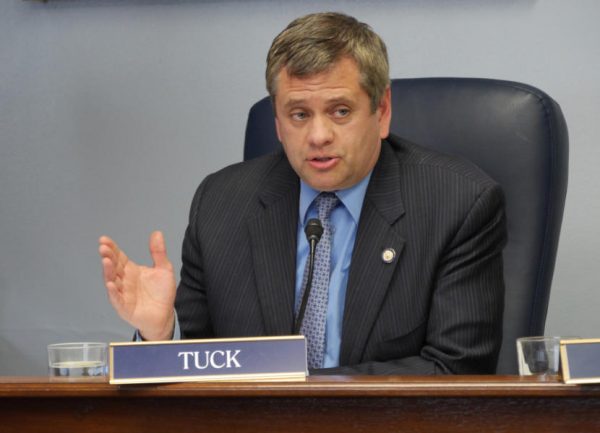
Kris Curtis works for the state’s Division of Legislative Audit. Last year, she had a routine task — an audit of state spending that has to be done every year.
But she said she ran into several problems when she was conducting the audit: The state denied her and her team access to financial records for oil and gas taxes, and the former revenue commissioner wouldn’t sign off on the accuracy of department records.
Also, the audit showed the state owes $1.6 billion more to the Constitutional Budget Reserve.
At the conclusion of the audit, Curtis wrote a “qualified opinion” — which means she can’t assure that all of the state’s financial records for last year are accurate.
Access denied
The federal government requires that the audit be done every year for the state to receive federal funding. And state law requires that the auditor have access to any information that’s relevant to the audit.
Curtis said this is the first time a department has decided to deny auditors access to records in the 28 years she’s worked for the Division of Legislative Audit.
The state’s Department of Law said in an emailed statement that the oil tax records the auditors needed are protected by attorney-client privilege. It said the state position has been consistent since former Gov. Bill Walker’s administration.
“We are disappointed that the Legislative Auditor has decided to cast aspersions on the Department of Law,” according to the statement.
Curtis and her team were trying to understand how oil companies reduced their tax payments to the state using tax credits. She said they were also trying to determine whether the companies’ settlements with the state circumvented the Alaska Legislature’s authority to appropriate the tax credits.
But the state refused auditors access to all of the documents they requested.
A $1.6 billion discrepancy
The audit also reflects a disagreement between the Legislature and Gov. Mike Dunleavy’s administration over whether oil tax settlement money should be deposited into the Constitutional Budget Reserve, a savings account the state has used to balance the budget.
This has been going on for years. Starting with Walker’s administration, lawyers for the state have maintained that these settlements should be deposited into the general fund, which is the main account the state uses to fund the budget.
As a result of this difference, the Department of Law has said that the state owes the CBR $1.6 billion less than the audit and lawyers for the Legislature said.
What’s “qualified”
State Rep. Chris Tuck, an Anchorage Democrat, chairs the Legislative Budget and Audit Committee, which reviews the audit every year. Tuck said he’s concerned that having a qualified opinion from the auditor will decrease lenders’ and the public’s trust in the state and hurt the state’s bond rating.
“We really need to get our auditors in there, to know what’s happening, to know that the transfers are happening properly and that the money is being deposited properly, and that taxes are according to statutes — that they’re following the law,” he said.
Tuck said he would like to hold a committee hearing on the audit as soon as possible. He hopes the committee can have a dialogue with the Department of Revenue and the Department of Law to understand their position.
If auditors don’t receive access to records they’re requesting, Tuck said the committee could subpoena the records. He emphasized that the subpoena would be aimed at giving the auditors access, not the committee.
“We don’t want to make this political,” Tuck said. “The auditor is a separate division. It’s constitutionally protected. We want to make sure that everything’s clean, smooth, without bias, without partisanship, and that we can make corrective action, and that the public knows that we’re doing everything right.”
In an email to Curtis, former acting Revenue Commissioner Mike Barnhill (now the deputy commissioner) asked to discuss with her the safeguards her office will have to preserve confidentiality of the tax records, including from legislators.
Both Curtis and Tuck said that the auditors wouldn’t share confidential records with lawmakers. They emphasized that there’s a firewall between the auditors and lawmakers, including maintaining separate computer systems.
Andrew Kitchenman is the state government and politics reporter for Alaska Public Media and KTOO in Juneau. Reach him at akitchenman@alaskapublic.org.




